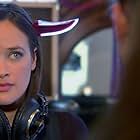IMDb RATING
6.8/10
3.9K
YOUR RATING
Tsukune takes a bus to his new school on his first day. Unbeknownst to him, the school is for monsters who go berserk at the scent of humans.Tsukune takes a bus to his new school on his first day. Unbeknownst to him, the school is for monsters who go berserk at the scent of humans.Tsukune takes a bus to his new school on his first day. Unbeknownst to him, the school is for monsters who go berserk at the scent of humans.
Browse episodes
Storyline
Did you know
- GoofsThe length of (inner and outer) Moka's hair periodically changes from butt-length to knee-length to ankle-length - sometimes in the same episode - with no explanation or anyone taking notice. This stands out considering how everyone else's appearances remain constant.
- Quotes
Yukari Sendo: [while ineffectualy punching Mizore in the breast] Take those ginormous sweater snowballs of yours and ski on 'em!
Featured review
To be honest, reviewing things on the IMDb has become a very unattractive pursuit in the last few years, for reasons I shall not go into here. But to see an entry finally added for Rosario + Vampire and not see any attempt, leave alone a good one, to make readers aware of what to expect... well, what can I do? Rosario + Vampire can basically be discussed in a couple of parallel threads. There is the manga, and there is this anime. Comparing one to the other is important, because it is important to understand why fans of the manga still cry out for a visual media adaptation. Another good point of comparison would be the enormously successful HBO series True Blood.
Manga and anime alike start through the eyes of a boy in his mid-teens who goes by the name of Tsukune. Tsukune is a profoundly average boy, and has failed the entrance exams to pretty much every school in Japan. But this is not meant to be a commentary about the intellectual caste system of Japan. Rather, it is a setup to explain how Tsukune is enrolled by his parents in the Youkai Academy after his father happens across a flier dropped by a suspect-looking person. Of course, anyone who knows the meaning of Youkai in Japanese knows where this is going. Tsukune, upon learning that he is enrolled in a school for mythical creatures, begins to write his withdrawal notice and make his way toward the exit. But what stops him is the young woman he met earlier in the day, a Vampire who goes by the name of Moka. Where Tsukune is the most average, unremarkable Human, Moka is one of the most elite and powerful Youkai of the lot, extraordinary even by Vampire standards. And she finds the taste of Tsukune's blood very much to her liking.
It is more or less after this introduction that the manga and anime go on very different paths. Whereas the characters of the manga face some extreme challenges that go straight to the root of their psyches, the anime is mostly farcical and only superficially explores any of the feelings the characters have about anything. We get told that Moka is very frightened of Humans because of her experiences of trying to attend school in the Human world, but aside from flashbacks, we get very little to concrete it. Mizore, easily my favourite character from the manga, is basically reduced to running jokes about popping up in the weirdest places and taking her desire of Tsukune a little too far. In the manga, the arc that introduces her shows her dealing with trust and abandonment issues as one of the sensei tries to take advantage of her. The kindness that Tsukune shows her as she fights off that sensei once and for all makes it patently obvious why she loves him. In the anime, we are just expected to accept it as a given.
Where the anime partially saves itself is in the relationship between Tsukune and Moka. Seeing them grow together as people as they learn to deal with each others' differences is a major component of the early manga that has been sadly lacking in recent volumes. One almost wishes the series had been around for George Lucas to watch when he was writing scenes for a pair of characters earlier in this decade. Since the anime is also very brief and to the point, there is a lot less gnashing of teeth about why Tsukune has to be so indecisive about which of the women chasing him he wants. But the biggest selling point of the anime by far is Nana Mizuki's voicework as both Inner and Outer Moka. As the more demure, gentle Outer Moka, she sounds sweet and childlike in a way that manages to not sicken this jaded old viewer (quite a feat in itself that Harry Potty et al could never achieve). Then when the Inner Moka comes out, she gently, calmly sounds like she could tear the viewer's head off just to see the rest of them twitch. It is no coincidence that all of the theme songs also feature Mizuki's voice prominently.
So if you are curious as to whether to introduce yourself to Rosario + Vampire through this series, I feel a comparison says it best. The manga is like Tim Burton's Batman. The anime is a somewhat more grown-up version of the Adam West abomination. But who knows? Maybe one day we might get that Takashi Miike R+V adaptation I hold my breath for.
Manga and anime alike start through the eyes of a boy in his mid-teens who goes by the name of Tsukune. Tsukune is a profoundly average boy, and has failed the entrance exams to pretty much every school in Japan. But this is not meant to be a commentary about the intellectual caste system of Japan. Rather, it is a setup to explain how Tsukune is enrolled by his parents in the Youkai Academy after his father happens across a flier dropped by a suspect-looking person. Of course, anyone who knows the meaning of Youkai in Japanese knows where this is going. Tsukune, upon learning that he is enrolled in a school for mythical creatures, begins to write his withdrawal notice and make his way toward the exit. But what stops him is the young woman he met earlier in the day, a Vampire who goes by the name of Moka. Where Tsukune is the most average, unremarkable Human, Moka is one of the most elite and powerful Youkai of the lot, extraordinary even by Vampire standards. And she finds the taste of Tsukune's blood very much to her liking.
It is more or less after this introduction that the manga and anime go on very different paths. Whereas the characters of the manga face some extreme challenges that go straight to the root of their psyches, the anime is mostly farcical and only superficially explores any of the feelings the characters have about anything. We get told that Moka is very frightened of Humans because of her experiences of trying to attend school in the Human world, but aside from flashbacks, we get very little to concrete it. Mizore, easily my favourite character from the manga, is basically reduced to running jokes about popping up in the weirdest places and taking her desire of Tsukune a little too far. In the manga, the arc that introduces her shows her dealing with trust and abandonment issues as one of the sensei tries to take advantage of her. The kindness that Tsukune shows her as she fights off that sensei once and for all makes it patently obvious why she loves him. In the anime, we are just expected to accept it as a given.
Where the anime partially saves itself is in the relationship between Tsukune and Moka. Seeing them grow together as people as they learn to deal with each others' differences is a major component of the early manga that has been sadly lacking in recent volumes. One almost wishes the series had been around for George Lucas to watch when he was writing scenes for a pair of characters earlier in this decade. Since the anime is also very brief and to the point, there is a lot less gnashing of teeth about why Tsukune has to be so indecisive about which of the women chasing him he wants. But the biggest selling point of the anime by far is Nana Mizuki's voicework as both Inner and Outer Moka. As the more demure, gentle Outer Moka, she sounds sweet and childlike in a way that manages to not sicken this jaded old viewer (quite a feat in itself that Harry Potty et al could never achieve). Then when the Inner Moka comes out, she gently, calmly sounds like she could tear the viewer's head off just to see the rest of them twitch. It is no coincidence that all of the theme songs also feature Mizuki's voice prominently.
So if you are curious as to whether to introduce yourself to Rosario + Vampire through this series, I feel a comparison says it best. The manga is like Tim Burton's Batman. The anime is a somewhat more grown-up version of the Adam West abomination. But who knows? Maybe one day we might get that Takashi Miike R+V adaptation I hold my breath for.
- mentalcritic
- May 27, 2011
- Permalink
- How many seasons does Rosario + Vampire have?Powered by Alexa
Details
- Release date
- Country of origin
- Official sites
- Languages
- Also known as
- Rosario + Vampire Capu2
- Production companies
- See more company credits at IMDbPro
- Runtime25 minutes
- Color
- Aspect ratio
- 1.78 : 1
Contribute to this page
Suggest an edit or add missing content




























